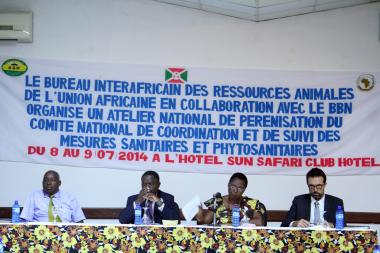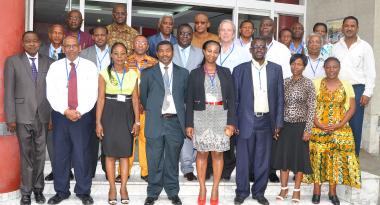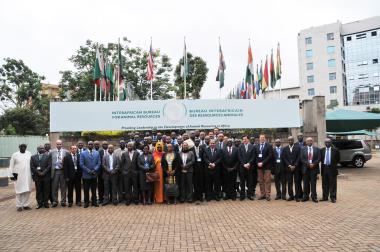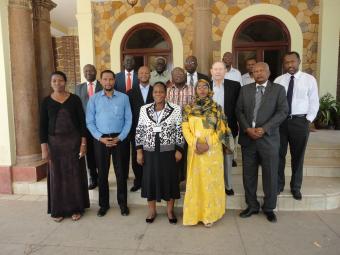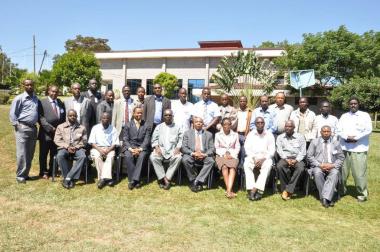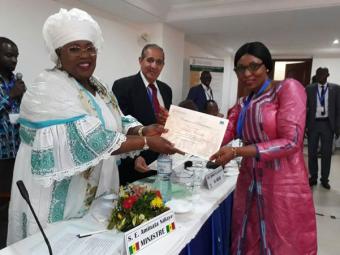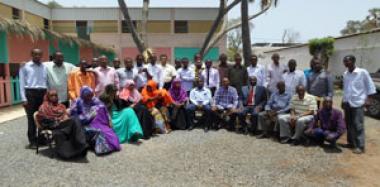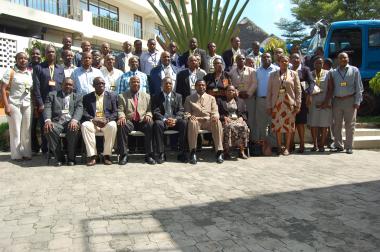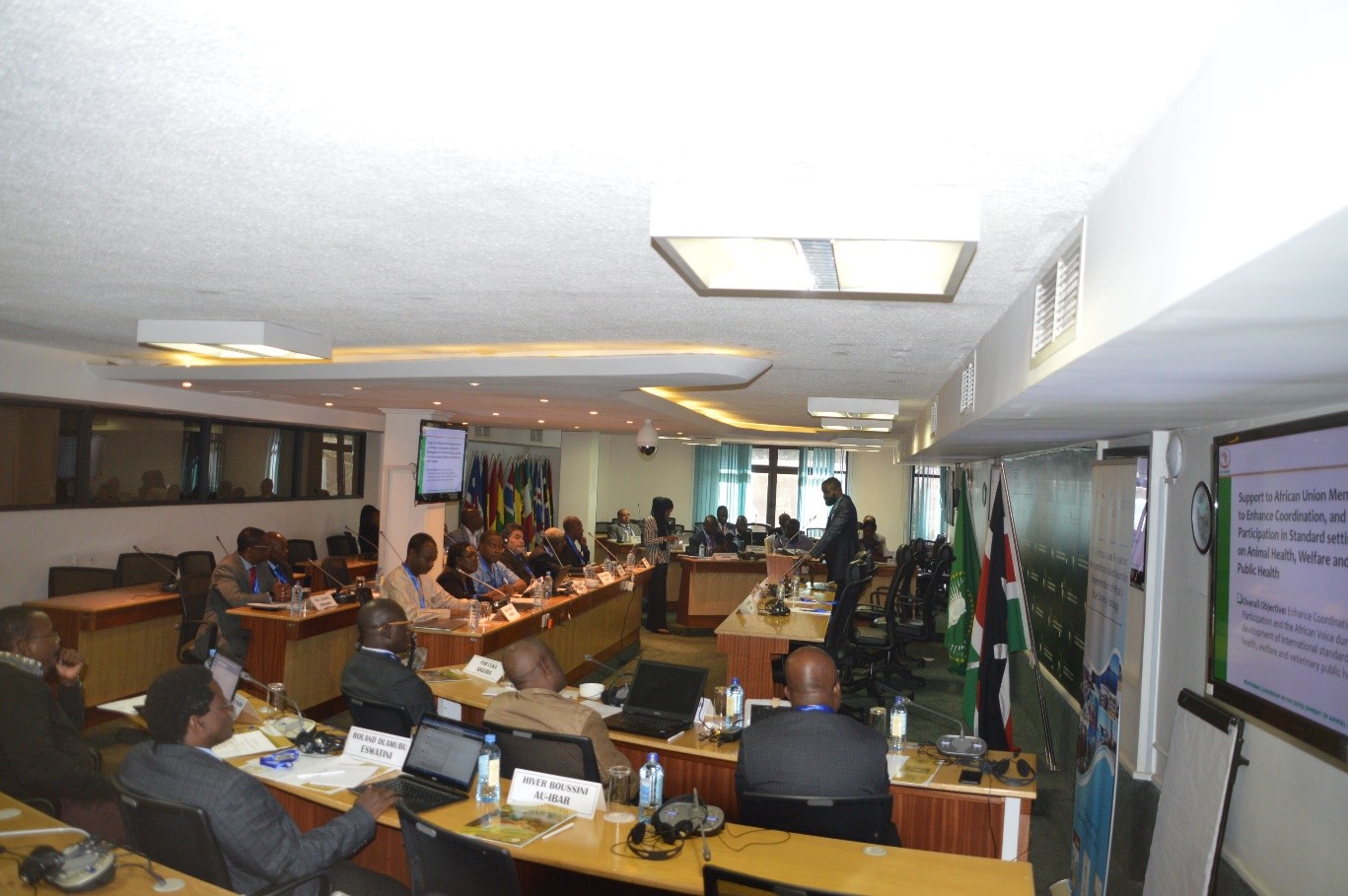
Animal health experts met in Nairobi, Kenya from the 6th to 10th January, 2020 to formulate a common position on draft OIE standards and make recommendations to boost the sector. The meeting was officially opened by Prof Ahmed Elsawalhy, Director Africa Union-Interafrican Bureau for Animal Resources (AU-IBAR).
In his speech, Prof Elsawalhy noted that since 2009, AU-IBAR has been convening meetings of Animal Health Experts to review, analyze and provide science-based comments on draft OIE standards. He further noted that: “This initiative was conceptualized and started by the EU- sponsored PAN-SPSO Project which has now been taken over by the Standards and Trade Secretariat for Animal Health and Food Safety with funding from AU Member States,” said Prof Elsawalhy.
The meeting was attended by 27 delegates from ten countries; namely Cameroon, Cote D’Ivoire, Egypt, Eswatini, Liberia, Uganda, Nigeria, Senegal, South Africa, Tunisia, Zimbabwe. The delegates comprised key focal point persons from ministries associated to Livestock, Fisheries and Animal Industry practitioners and researchers; Virologists, Fish Diseases and management, Quality Management Officers from National Standards, Agriculture & Forestry University instructors, Directors of Veterinary Services, and Ministries of Livestock and Animal Production were the main attendees.
During the workshop opening, Prof Elsawalhy used the opportunity to welcome experts from Liberia, Nigeria and Zimbabwe who were attending the meeting for the first time. He congratulate the three countries for being the first batch of countries to be supported over a three-year period. In his speech, he noted that the success and lessons to be gained from this initiative would catalyze a continental-wide drive towards greater standards culture, consumer awareness on quality and development of animal resources value chains,” he said.
Speaking during a presentation on the meeting objectives and outcomes of the meeting, John Oppong-Otoo, Food Safety Officer at AU-IBAR highlighted the importance and objective of the meeting. He noted that: “Our objective is to improve the quality of Africa’s participation in the work of international standard setting organizations. We are motivated by the need to ensure that Africa’s interest in the Global Animal Commodities trade must be safeguarded and not compromised during development of international standards. Our vision is that Africa will become a world leader in developing and using risk-based standards.”
He further noted the role of African countries in strengthening instruments, promoting good governance and promoting standards in creating a conducive environment for pursuing Africa’s regional integration and promoting intra-Africa trade in animals and animal products. He highlighted that: “Standards are one of such important instruments for enhancing Governance. And their harmonization and application across Africa will be vital to facilitating safe trade in animal commodities within the African Continental Free Trade Area (AfCFTA) which will be operational in July this year”.
It was further noted that one of the key objectives of the AfCFTA is to promote industrial development through diversification and regional value chain development. Therefore by developing standards, supporting value addition, facilitating capacity building of the productive sector for application and compliance with standards are necessary imperatives for removing non-tariff barriers in the African Common Market.
The five-day meeting methodology consisted of three sessions, namely: (i) An overview of the OIE standard setting process: Terms of Reference of Specialist Commissions, Current Discussions on the main issues for consideration by the February 2020 Specialist Commission Meetings methods of reviewing draft Chapters. (ii) Presentations of Country Projects on improving national coordination mechanism on OIE standard setting; (iii) Reviewing and providing comments to the Draft Chapters of the Terrestrial Animal Health Code and formulation of Common Position.
At the end of the workshop, the Terrestrial Animal health Group and Aquatic Animal Health Group agreed on six-point recommendations to boost OIE standards. The recommendations include:
- Member States to establish sustainable coordination mechanism, permanent desk, resourced with the requisite expertise and funds for the continuous monitoring and commenting on OIE standards.
- The need for beneficiary countries to be encouraged to share experience on continuous basis and lessons learned from the projects should be compiled into good practice paper for dissemination.
- The need for Africa to safeguard its trade interest by prioritizing research and commissioning studies that can be used to shape decisions during the development of priority animal health, welfare and veterinary public health standards by the OIE.
- The need for Member States to progressively improve their Veterinary Services by domesticating and applying OIE standards.
- Veterinary Education Establishments, Veterinary Statutory Bodies, Veterinary Authorities and the African Union to promote minimum standards in veterinary education, with an emphasis on Aquatic animal health in veterinary curriculum, through harmonization of curriculum, in order to maintain an acceptable level of competence in the veterinary profession across Africa.
- Member States to engage in twining program for laboratories, VSBS, VEEs as a means to build capacity for disease prevention, detection and control.

